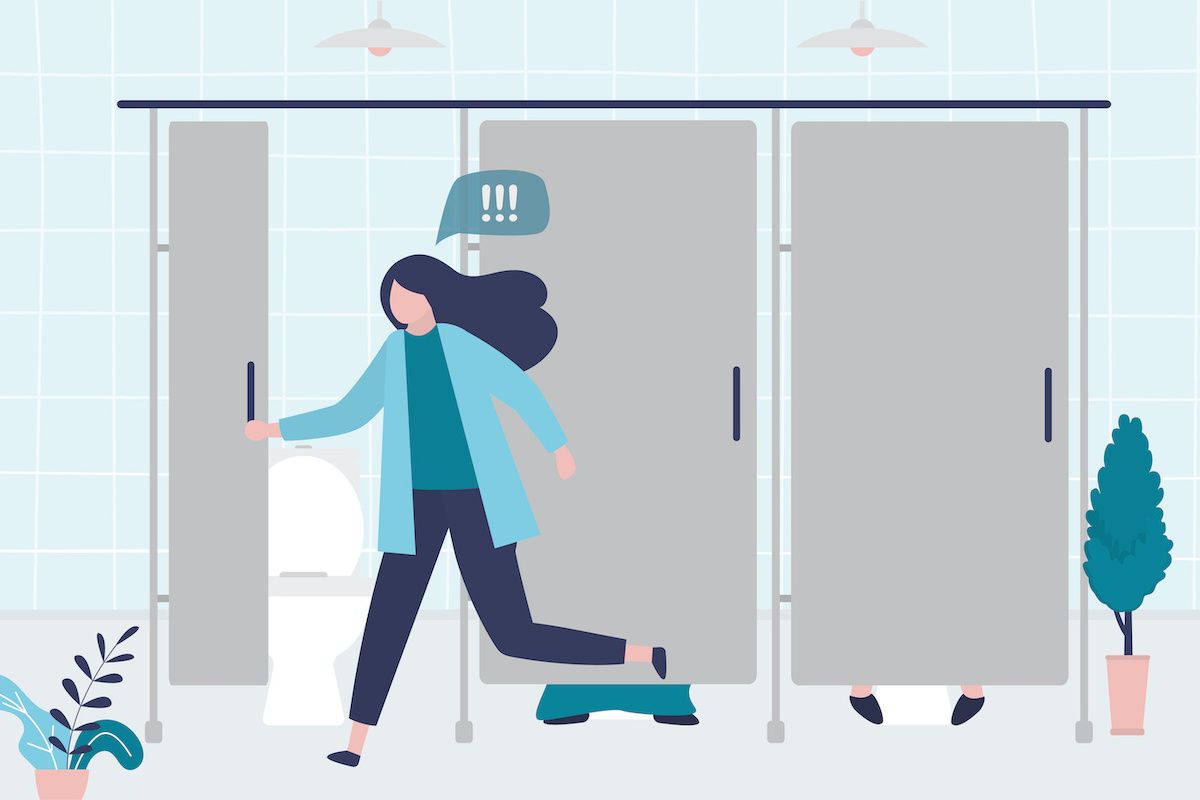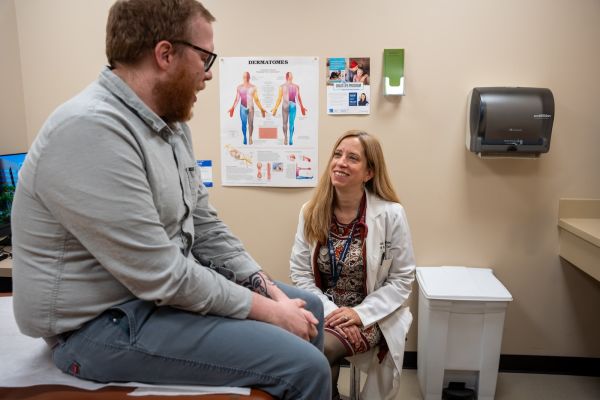Roswell Park offers “life changing” technique — sacral nerve stimulation — to help patients regain bowel control
Let’s face it...many people are too embarrassed to report fecal incontinence (involuntary or accidental leakage of feces) to their doctors. Which is why colorectal surgeon Anthony Dakwar, MD, FACS, at Roswell Park Comprehensive Cancer Center makes sure to ask his patients about it.
“Fecal incontinence is surprisingly common in the general population, but even more so in patients who have had certain types of cancer and treatments,” says Dr. Dakwar. “Fortunately, we offer several specialized techniques to help patients with incontinence, including dietary consultation, physical therapy with a pelvic floor expert, and sacral nerve stimulation, the simple and often life-changing procedure now available at Roswell Park.”
We are here to help
Meet with our expert to learn whether sacral nerve stimulation is right for you.
What causes incontinence?
Incontinence occurs when the nerves and muscles of the bladder, gastrointestinal tract, urethra or rectum are damaged or simply lose muscle tone, which can be a result of aging, neurological disorders, certain stimulants (foods, caffeine, medications), illnesses (urinary tract infections), and tumors and abnormal growths that can affect systems related to the bladder and bowel.
Incontinence is more common in women, as urinary and rectal nerves and muscles can be damaged during childbirth. Hormonal and weight changes, too, especially during pregnancy and menopause, can cause incontinence. In men, an enlarged prostate is one of the most common causes of urinary incontinence.
"Cancer patients, especially those with gynecologic, colorectal, anal or prostate cancer, are even more prone to incontinence, because both the cancer and the treatments, such as surgery, chemotherapy and radiation can damage structures, nerves and muscles of the pelvis and interfere with nerve signals involved in bladder and sphincter control,” says Dr. Dakwar. “I’d estimate that 60 to 70% of women over 45 who’ve birthed vaginally, had pelvic trauma, and especially those who have had GYN or lower GI cancer surgeries or treatments, suffer from urinary or fecal incontinence, or both.”
Treatment options for fecal incontinence
As part of our multidisciplinary care, Roswell Park offers several services and treatments to help those suffering from incontinence, explains Dr. Dakwar. He also notes that you do not need to be a cancer patient to utilize these services at Roswell Park. These include:
- Dietary guidance. Consumption of certain foods, liquids and medications can affect incontinence. Roswell Park’s registered dietitians can help patients identify substances that trigger incontinence and substances that will help reduce incontinence.
- Pelvic floor therapy. Strengthening and activating the muscles of the pelvic floor – which support the bowel, bladder and uterus – can improve incontinence. Roswell Park physical therapist Renée Genereux, DPT, specializes in treating pelvic floor dysfunction in a private and safe setting.
- Sacral nerve stimulation (SNS). This new treatment uses a small medical device to stimulate and send electrical signals to the nerves and muscles in the pelvic area, including the pelvic floor, urethral sphincters and bladder sphincters, which alert the brain to sensations of fullness of the bladder or rectum.
How sacral nerve stimulation works
“Sacral nerve stimulation is one of the most rewarding procedures I perform, in that it is a fairly simple, quick and relatively painless procedure that has a high rate of success,” says Dr. Dakwar. “For patients who qualify as candidates for this, it has a huge impact on their quality of life. It can help people become more active and confident, without having to worry about embarrassing accidents."
“The first step is an evaluation of the patient, to determine whether they meet certain criteria – including any history or evidence of bowel and/or urinary incontinence that has negatively impacted their lives. We also want to determine if other options might work for them, or if other options have not worked well for them,” says Dr. Dakwar.
Installation of the SNS device is typically a one-hour outpatient procedure that is performed in two stages. In the initial trial stage, a temporary thin wire is inserted near the sacral nerves in the lower back and attached to a small, discrete medical device (about the size of a credit card) which is taped to the patient’s back. "The patient will usually leave the hospital within an hour and should be able to tell by the next day or two if the device is helping them,” says Dr. Dakwar. “After a positive trial phase of a week, in a one-hour outpatient procedure, we implant the device just under the skin in the upper buttock. The battery in the device typically lasts 10 to 15 years, and as with pacemakers and many other medical devices, the SNS unit can be monitored and fine-tuned remotely by the manufacturer.”
A patient’s experience with sacral nerve stimulation
Like Dr. Dakwar, Roswell Park patient Mary Guevara, age 37, is not shy about discussing anal cancer and its effects, including incontinence.
“After being told by a doctor for three years that my rectal bleeding was probably ‘just hemorrhoids caused by childbirth,’ part of my mission now is to make people more aware of the symptoms of anal cancer and to help support them through what can be a difficult and sometimes embarrassing diagnosis,” Mary says.
By the time Mary’s anal cancer was discovered, it had advanced to Stage 3. “I was treated at Roswell Park and got great care and support. However, the targeted radiation and chemotherapy that were part of my treatment were brutal. My skin and pelvic organs were damaged, I went into menopause, and I developed some autoimmune disorders, as well as urinary and fecal incontinence.”
Through trial and error and learning from other anal cancer survivors (including actor Marcia Cross, of “Desperate Housewives” fame), Mary adjusted her diet. “I learned that, among other things, eggs and anything high in sugar made my incontinence worse.” Six weeks after completing her chemoradiation regimen, Mary started pelvic floor therapy. “Renee Devereaux definitely helped me, and my urinary incontinence was somewhat reduced, but even after seven months of PT, I still suffered from fecal incontinence."
In April 2022, Mary received a call from Renee. “She told me that Dr. Dakwar was now doing SNS procedures at Roswell Park, and she thought I might want to look into it. After learning a bit more about the procedure, I consulted with my sister, who is a nurse at Roswell Park. She confirmed that, when successful, SNS can be life-changing, and she encouraged me to schedule an appointment with Dr. Dakwar.”
“Dr. Dakwar wasn’t kidding when he said it was a short and relatively painless procedure to have the device installed,” Mary says. “The day after the initial trial of the device, I was back at my job as a teacher, and I immediately felt some improvement in my condition. I also worked with the representative at Medtronic who remotely fine-tuned the device for even better personalized control. The following week, Dr. Dakwar implanted the SNS device.”
"After just a few months with the device, I can honestly say that sacral nerve stimulation has helped reduce my incontinence and improved my quality of life by about 90%,” Mary says. “I can go out now with much more confidence. I don’t have to worry nearly as much about being near a bathroom, having accidents, or bringing a change of clothes. I can do more things with my family and can stay in my classroom with my students for longer periods of time. And, by telling others about my experience, I can hopefully offer them some knowledge, positivity and confidence."
We are here to help
Meet with our expert to learn whether sacral nerve stimulation is right for you.





